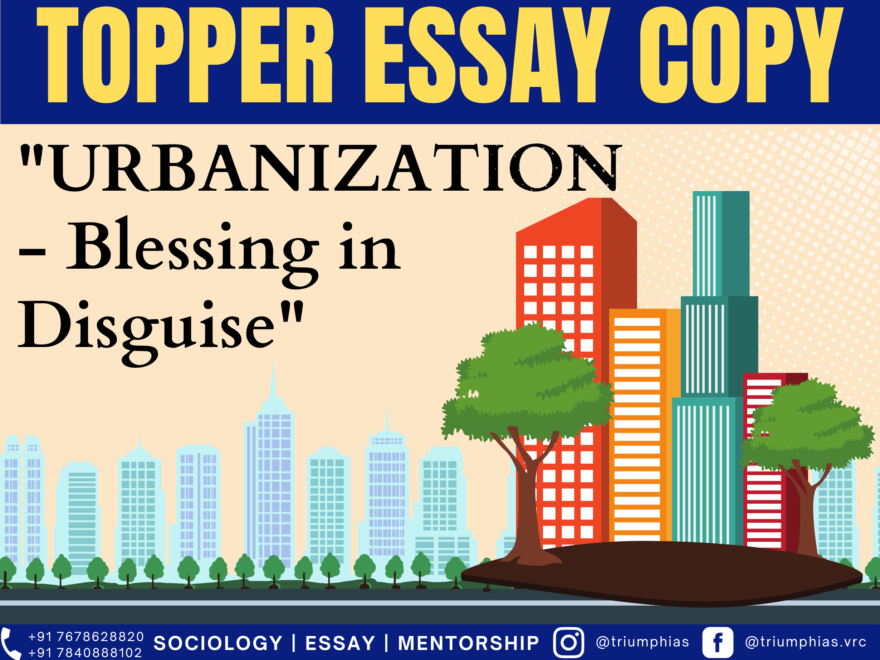IAS,FAIZAN AHMED

Essay topic:
“URBANIZATION – Blessing in Disguise”
(Relevant for Essay Writing for UPSC Civil Services Examination)
“URBANIZATION – Blessing in Disguise”18th century England was undergoing a dramatic shift – socially and economically. With the invention of various sophisticated tools called “machines,” a revolution in the production of goods – the Industrial Revolution – had begun. This led to the emergence of the world’s first towns and cities. The inventor of the spinning jenny, who went by the surname Luddite, had just lost his job as a textile worker to the same machine. To protest, he started the Luddite movement, which aimed to reverse this mechanical revolution. However, his efforts failed. In fact, many like him found better-paid jobs after moving to cities from villages, seeking a better life. Thus, urbanization began – something that the Luddites initially considered a bane but turned out to be a boon for millions of impoverished peasants. Urbanization became a blessing in disguise. But what is urbanization? Webster defines it simply as the movement of populations from villages (rural centers) to cities (urban centers) for a better life. It involves the creation of mega cities and metropolitan centers as hubs for trade, commerce, and other economic activities. Unfortunately, in the context of India, urbanization has not yet become a blessing. Despite nearly one-third of India’s population living in cities and a projected increase by 2050 (as per the 2011 census), our spending on urban infrastructure stands at a meager $166 per capita, compared to countries like Zimbabwe and Bangladesh, which spend over $30 per capita. Before we embark on supporting the urbanization of India, let us explore how it can be a blessing in disguise and what disguise it takes. The significance of urbanization aligns with our evolutionary development and is supported by the laws of nature. As humans evolved from using simple stone tools in the grasslands of the savannah, their socio-cultural life advanced. They moved from small bands to tribes living in small hamlets and eventually to small villages with the onset of the Neolithic revolution. Further advancements led them to establish the first urban centers like Harappa and Mohenjo-Daro in India, Sumer in Mesopotamia, and Thebes, Luxor, and Alexandria in Egypt. Urbanization has been an important phenomenon and tool for human progress throughout history. As humans moved to urban centers, their economies improved due to efficient division of labor, leading to increased production and consumption. Today, urbanization offers benefits such as a higher standard of living, increased wages and incomes compared to rural areas. On average, wages in cities are at least twice as high as those in villages. However, it is important to acknowledge that India faces challenges such as disguised poverty, a high divide between rich and poor, lack of social security, and informal jobs. These issues can be attributed to government apathy and haphazard urbanization, unlike cities like London and New York. Urbanization has not only brought economic benefits but also societal advantages, especially in the case of India. Villages have become hotbeds of caste-based atrocities and discrimination against lower castes. This was one of the reasons why Dr. Ambedkar urged Dalits to move towards cities if they wanted to escape the clutches of the oppressive caste system. He always opposed village-based governance. Although urban centers have not fully realized Dr. Ambedkar’s vision of a Marxist utopia, they offer better opportunities for marginalized communities. In cities, markers of identity are less visible, giving more importance to achieved status rather than ascribed status. Modern means of transportation like metros have proven to be a blessing in disguise. Society is made up of individuals, and from the perspective of individual liberties, urban centers have emerged as liberators. Individuals have more freedom to marry whomever they choose. Although honor killings and other challenges persist (as seen in cases like the Hyderabad killing of an inter-caste couple), cities offer wider freedom of choice compared to rural areas. When we talk about society and freedom, we cannot overlook our LGBTQ brothers and sisters. Today, they can organize pride parades thanks to the liberal mindset of city dwellers. This further proves that urbanization is a blessing for individual liberties. The development of such a liberal mindset is often attributed to the provision of secular and progressive education in cities, especially through private schools. When Christian convent schools began proliferating as centers of education, there were concerns about religious conversion activities. However, they proved to be a blessing in developing a liberal attitude among citizens compared to dogma-based education in villages. Reports like PRATHAN’s ASER report have consistently highlighted the positive impact of urbanization on quality education. The Ministry of Human Resource Development (MOHRD) education indices also support this notion. Urban centers have facilitated cultural exchange and the development of pockets of mini-India. Cities have helped India become inclusively multilingual and multicultural, fostering tolerance and mutual respect for other faiths and beliefs. Celebrations like Onam and Bihu in Delhi and Lohri in Bangalore are testaments to this diversity. As people become more liberal in their thoughts and embrace multicultural ways of life, they play a significant role in strengthening our democracy and institutions. Civil society organizations, NGOs, and pressure groups have all contributed to this struggle. For example, the fight for Right to Information (RTI) was led by a city-based NGO, while various civil society groups advocated for the welfare of migrant laborers during their exodus from cities during the recent COVID lockdown. These collective efforts have led to government announcements of various welfare measures during the pandemic. Urbanization has once again proven to be a blessing by fostering a more accountable government and improving healthcare systems in cities. Super specialty hospitals and better health outcomes are some positive outcomes of urbanization. However, amidst all these blessings, there are also challenges associated with urbanization that cannot be ignored. The foremost issue is environmental degradation and global warming leading to climate change. Cities have been both engines of growth and contributors to environmental degradation. The annual event of Delhi’s air pollution serves as a stark example. Cities have attracted large-scale migrants from villages who often endure miserable living conditions, low wages, and poor hygiene and sanitation due to exploitation. The mega slum of Dharavi in bustling Mumbai stands out as an example. The recent COVID-induced lockdown led to mass exodus of migrants from cities back to their villages, leaving a lasting impact on our urban conscience. Political violence, religious riots, communal lynchings, commercialization of education, economic exploitation of workers, rising intolerance, and other issues have become synonymous with the process of urbanization. However, one can argue that these problems may be more due to haphazard and unplanned urbanization resulting from government failures rather than inherent flaws in urbanization itself. What is needed today is not demonizing urbanization but rather addressing these issues through better planning and execution. Urbanization is the only way forward as our civilization advances. The blessings we discussed should be augmented by solutions to these challenges. We can learn from various global best practices and streamline our processes accordingly. The Singapore model can serve as an example for us to follow. Sustainable urbanization should be our way forward, where we prioritize not only economic growth but also environmental sustainability. This should be our mantra as India strives to become a $5 trillion economy and a globally responsible superpower. India’s image as a leader should not only be based on economic prosperity but also on responsible governance. Urbanization is here to stay, but the associated problems can be addressed. The blessings need not remain disguised but should be open and visible for all to see. |
To master these intricacies and fare well in the Sociology Optional Syllabus, aspiring sociologists might benefit from guidance by the Best Sociology Optional Teacher and participation in the Best Sociology Optional Coaching. These avenues provide comprehensive assistance, ensuring a solid understanding of sociology’s diverse methodologies and techniques
Meta Tags:
Water Resource Management,Water Resource Management,Water Resource Management,Water Resource Management,Water Resource Management,Water Resource Management,Water Resource Management, Water Resource Management,Water Resource Management,Water Resource Management,Water Resource Management

Why Vikash Ranjan’s foundation Classes for Essay?
Proper guidance and assistance are required to learn the skill of writing essay topics in CSE examination. VIKASH RANJAN SIR at TRIUMPH IAS guides students according to the Recent Trends of UPSC, making him the Best Essay Teacher for Essay writing UPSC.
At Triumph IAS, the Best Essay Writing Coaching platform, we not only provide the best study material and applied classes of Essay for IAS but also conduct regular assignments and class tests to assess candidates’ writing skills and understanding of the subject.
Choose The Best Essay Writing Teacher for IAS Preparation and Know our Approach for Essay?
- The Programme is Planned & Executed in a Way that You Write a good Essay for obtaining Effective Score of 140 Plus.
- In this programme we provide Classes on
- How to INTRODUCE The Topic in Context of the THEME of the Essay
- How to Elaborate & Explain the Topic-Theme on Temporal Scale & Sectoral Scale as well as Intellectual Scale in the MAIN BODY of the Essay.
- How to Sum up the Topic in CONCLUSION in Context of the Essay Topic Theme.
- ︎We will Teach You How to use the Knowledge Matrix of General Studies & Optional to write a Good Essay more Logically and Coherently.
- After the Classes You have to “Write to Learn & Learn to Score” .This means You have to Write the Essay Test Papers & Learn from the Feedback & Discussions.
Why Essay is Important and What We Offer in “Essay Test Series”?
- Triumph’s Essay Upgradation Test Series (Under Personal Guidance of Vikash Ranjan Sir) doesn’t only focus on improving student’s linguistic skills but also focus on improving student’s ability to comprehend the topic-sentence (subject) recall & relate the facts, concepts, propose thesis-statements, and logically assimilate the ideas & counter ideas with clarity in expression on temporal & Sectoral Scales of knowledge.
- Further students are provided one-on-one INTERACTION* Session with Vikash Ranjan Sir. Students get personal feedback on their strength and weaknesses, regarding what is ‘good about their essay and what more should be done to make it a better one’ by Vikash Ranjan Sir.
Why to take up this “Essay Test Series and Foundation” Course?
- Essay is Low hanging Fruit. Marks in Essay is Effectively Contributing in Final Selection in New Pattern of Mains Exam. With a Well Developed ‘Knowledge Matrix and Rigorous Practice’, One can Score upto 160 + in Essay. So IAS Aspirants should never Ignore Essay Preparation
- Inculcating Writing Competency in Essay for IAS, which is Different from Essay in English, Essay in School and College.
Follow us :
🔎 https://www.instagram.com/triumphias
🔎https://www.youtube.com/c/TriumphIAS
🔎https://t.me/VikashRanjanSociology
Find More Blogs…
| Compare and contrast Karl Marx’s and Max weber’s | Karl Marx- Historical Materialism |
| Position of Women In the Modern Indian Society | Sociology: Social system and pattern variables |
keyword: Urbanization, Industrial Revolution, Economic activities,Urbanization, Industrial Revolution, Economic activities,Urbanization, Industrial Revolution, Economic activities,

